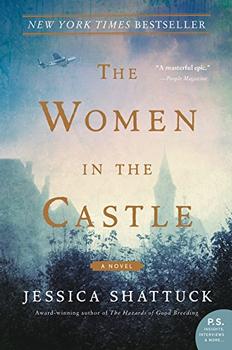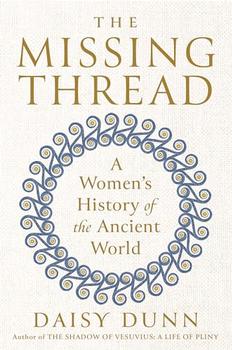Summary | Excerpt | Reading Guide | Discuss | Reviews | Beyond the Book | Readalikes | Genres & Themes | Author Bio

"Elfie—" She turned to the au pair. "Will you see to it that the candles are out by eight? The girls may come down to the landing, but no farther."
"But—"
Elisabeth began, and Marianne shot her a look.
"Goodnight," she said, giving an extra squeeze to sweet, quiet, dark-haired Katarina and kissing Elisabeth's maddening little brow.
On her way downstairs, Marianne paused on the landing to observe the hall below, its stone archways illuminated by candelabras. The flickering light lent the room an exciting, almost spooky glow. Early guests had begun to arrive: the men in waistcoats and tails, a few in uniforms with gaudy new Nazi insignias stitched on the lapels; the women in fine new dresses. Under Hitler, the economy was growing strong: people had money, once again, for silk and velvet and the new Parisian styles. From a throne-like seat in the middle of the hall, the countess greeted her guests, her wheelchair carefully hidden away for the evening. She was a mountain of blue and green silk, the likes of which no other German woman of her age (or any other) would wear. Her laugh rang out strongly for someone in poor health—had there ever been a woman who loved a party more? And there, bowing before her, was the guest who elicited this peal of laughter: Connie Fledermann. Marianne felt a rush of excitement. Who else received such a welcome? Connie was a great favorite of the countess's, a star in his own right, a man whose boldness of character, wit, and intelligence rendered him beloved by all—a charmer of ladies, a receiver of men's trust and confidences. No one, from crazy Hermann Göring to somber George Messersmith, was immune to Connie's charisma.
"Connie!" Marianne called as she approached.
He turned and a grin spread across his face.
"Aha! The woman I have been waiting for!" He lifted her hand to his lips. "You are looking lovely." He cast his eyes up to the landing. "Will I get to see my princesses or have you put them away?"
"Put away," Marianne said with a laugh. "I hope."
"Alas." He placed his hands over his heart and feigned collapse. "Well, at least I get to consort with the queen mother. Come"—he extended his arm—"meet my Benita!"
Marianne's smile stiffened. In the drama of the past week, she had forgotten. Martin Constantine Fledermann was to be married. It seemed impossible. Even with the date set (two weeks from today!), it still had the ring of a lark gone too far.
But he was earnest, even nervous, as he took Marianne by the elbow. "You must befriend her," he said. "She knows no one. I told her you would be her ally. And"—he turned to her—"you know she will need one here."
"Why is that?" Marianne asked. "You are among friends."
"True," Connie said. "But she is not."
Marianne frowned at his circular logic, but there was no time to question it because suddenly there she was, Connie's Benita, a strikingly pretty woman with the kind of flat, Nordic face that emanated placidity. Her blond hair was plaited and wrapped around her head in the style so adored by the Nazis, a Wagnerian Brunhilde in an honest-to-God dirndl dress. She stood between two young men who worked with Albrecht in the Foreign Office, both of whom looked delighted. Marianne felt an unusual pang of jealousy. It was not that she envied the younger woman's beauty or palpable air of sexuality (she herself had long ago carved out an alternate road to male regard), but at this moment, in the company of these three men—two silly, overeager boys and one dear friend, childhood sweetheart, luminary of the opposition—the other woman's beauty left her nowhere to go. At thirty-one, Marianne was an adult in a child's play, a schoolmarm among excitable students.
"Excuse me, boys," Connie said, making a show of elbowing one of them aside, "I need to reclaim her." He put a hand on Benita's arm and pulled her toward Marianne. "My love," he addressed Benita (how odd it was to hear him say this), "meet my—what shall I call you?" He turned to Marianne. "My oldest friend, my sternest adviser, the person who keeps me most honest?"
Excerpted from The Women in the Castle by Jessica Shattuck. Copyright © 2017 by Jessica Shattuck. Excerpted by permission of William Morrow. All rights reserved. No part of this excerpt may be reproduced or reprinted without permission in writing from the publisher.




Your guide toexceptional books
BookBrowse seeks out and recommends the best in contemporary fiction and nonfiction—books that not only engage and entertain but also deepen our understanding of ourselves and the world around us.